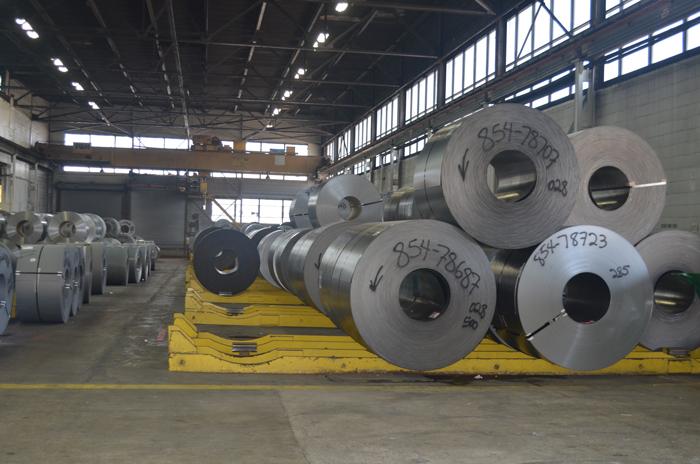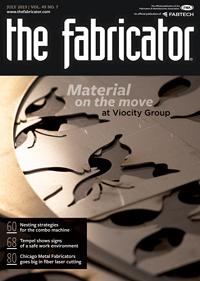Editor-in-Chief
- FMA
- The Fabricator
- FABTECH
- Canadian Metalworking
Categories
- Additive Manufacturing
- Aluminum Welding
- Arc Welding
- Assembly and Joining
- Automation and Robotics
- Bending and Forming
- Consumables
- Cutting and Weld Prep
- Electric Vehicles
- En Español
- Finishing
- Hydroforming
- Laser Cutting
- Laser Welding
- Machining
- Manufacturing Software
- Materials Handling
- Metals/Materials
- Oxyfuel Cutting
- Plasma Cutting
- Power Tools
- Punching and Other Holemaking
- Roll Forming
- Safety
- Sawing
- Shearing
- Shop Management
- Testing and Measuring
- Tube and Pipe Fabrication
- Tube and Pipe Production
- Waterjet Cutting
Industry Directory
Webcasts
Podcasts
FAB 40
Advertise
Subscribe
Account Login
Search
Signs of a safe work environment
A tour of steel laminations manufacturer Tempel reveals one message: Safety first
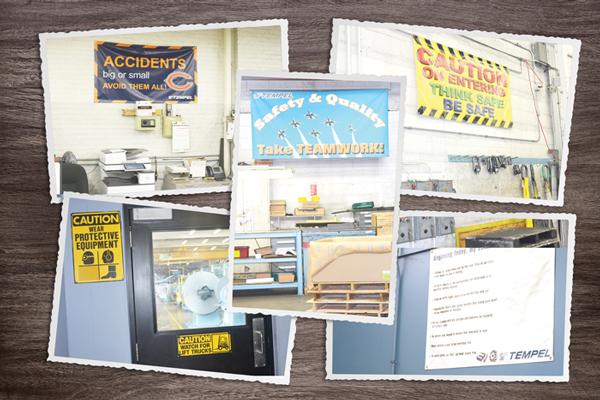
Signs alert Tempel employees that they should be thinking about safety before anything else. Sometimes the sign is a simple reminder, and other times it reminds them of the required commitment (reinforced with their own signatures) or direct instructions before stepping foot onto the shop floor.
When asked about safety awareness at Tempel, Ali Qureshi, the company’s slitting supervisor, waxes philosophical: “I tell people when they come to work in the morning not to think about safety but to feel it.”
The statement encapsulates the safety environment at Tempel, a manufacturer of magnetic steel laminations for the motor, generator, automotive, and transformer industries with locations in Chicago; Burlington, Ont., Canada; Changzhou, China; Chennai, India; and Monterrey, Mexico. Qureshi said that keeping safe is not about ticking a box to note that a safety check was done prior to a metal fabricating activity. It’s about feeling safe and allowing people to focus on the job at hand. There is no pressure to cut corners in the name of higher productivity or expediting a job through the shop. Safety is addressed before anything else occurs.
Chigozie Okere, PhD, can verify this. As Tempel’s global environmental health and safety manager, he typically is given the floor first during meetings and conference calls in which he participates. Safety is always the No. 1 topic on the agenda.
“We don’t play around with safety,” Okere said. “Anything I have to say people take seriously.”
Tempel’s Chicago facility is filled with processes and equipment that require employees’ full attention. They are working with very heavy steel coils that have to be moved through the facility for slitting and punching in mechanical presses varying from 25 to 400 tons. Some laminations also are cut on a laser cutting machine. The laminations are then moved to heat treating in large furnaces. Injuries from lacerations to amputations are a real possibility if unsafe actions take place.
Fortunately, Tempel has worked to ensure that injuries are minimized. It had only two injuries in 2018 that were reported to the Occupational Safety and Health Administration, and only one lost workday related to those injuries. Its recordable incidence rate (the total recordable injury/illness cases multiplied by 200,000 and then divided by total employee hours worked) dropped from 1.2 in 2017 to 0.2 in 2018, with more than 50,000 additional employee hours than the year before. Odds are very good that the company’s 120 employees at its Chicago plant are going to arrive home in the same shape that they left the house in the morning.
This safety performance helped Tempel earn the 2019 Rusty Demeules Award for Safety Excellence from the Fabricators & Manufacturers Association in April. The award is sponsored by CNA. The Rusty Demeules award is presented annually to one company that outperforms the manufacturing industry’s recordable incidence rates and demonstrates an outstanding safety culture.
Okere, who has been with Tempel for almost two years, said he knows that such success does not come easily and that the company has been working diligently to minimize risks in the facility. He recognized management’s support of safety initiatives and knew that, like any improvement effort, Tempel couldn’t rest on its laurels and maintain its current level of success. It needed to maintain the safety commitment.
“You need to be consistent because if you loosen the grip a little bit, everything can collapse. You’ll see everyone relaxing, and you begin to see people with more lacerations, for example, because they are not putting on their hand gloves,” Okere said.
He related a story about a similar manufacturer whose workforce had 189 recordable injuries in a recent year. That not only puts in perspective how far Tempel has come when compared to its peers, but also what can happen when a safety culture is not fostered regularly.

A big part of Tempel Steel’s business is making motor and generator laminations. (The laminations, stacked on top of each other, form the core of coils used to produce magnetic fields that help to power the motors and generators.) These laminations are cut on a TRUMPF laser cutting machine.
These are the four ways that Tempel keeps its employees safe.
1. See It and Say It
Okere said he believes one of the most important recent programs to go into effect is for all employees to play the role of safety manager. They are encouraged to report any unsafe behaviors.
“Tell us what you see in the factory, the campus, or outside those areas,” Okere said. “We want to apply the corrective measures before it leads to a hazard.”
Understandably, some people might not feel comfortable reporting a co-worker who is not wearing the correct personal protective equipment, for example. For those situations, Okere established suggestion boxes in each department of the manufacturing facility. People now can submit comments anonymously and not worry about being identified as the reporter of risky work practices.
Okere’s safety committee, comprising employees from various manufacturing departments and shifts, meets monthly to review and discuss some of these reported issues to determine what type of reaction is required. Some may be deemed important lessons for all departments in Chicago and for the other plants in the Tempel family. Some might call for a small conversation with the employee making unwise safety choices.
As an enticement, people who submit reports are eligible to earn a reward. The reward used to be gift cards, Okere said, but has since evolved into safety-related items such as shoes and eyewear.
2. Get out and About
“I check on the place almost every two hours when I’m not having meetings,” Okere said. “I check on people while I’m walking around. I’m teaching.”
It sounds like a simple strategy, but some people are more comfortable working behind a desk and letting others fight the safety battles. Okere said walking around helps him to learn more about the people he works with and let’s them learn about him. It’s one of the first things he started to do when he went to work for Tempel.
Of course, the walks got him familiar with the campus and the employees, but the continual appearances on the shop floor were a constant reminder of why he was there. However, he wasn’t looked upon as being some sort of safety enforcer, but more as a friendly counselor.
“A walk around is very simple. It helps people to relax,” Okere said. “You don’t really need to sit everybody in the classroom at all times.”
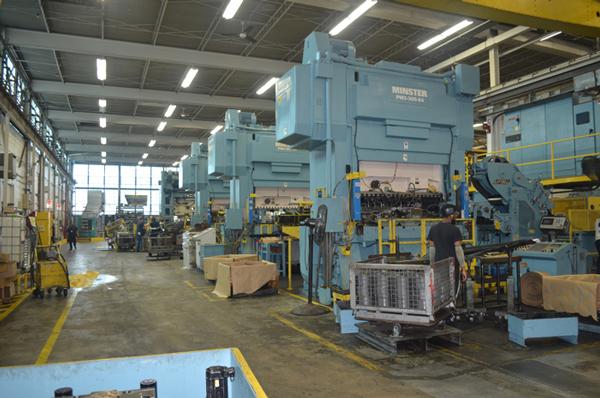
Laminations also are produced on stamping presses, which can pose a real risk for operators not paying attention to safety.
Okere, who recently completed his doctorate in organizational leadership, said that his regular appearances on the shop floor help him to break down potential walls with employees. People understand his role, but they also know that reminders for improved safety behavior will be done in a friendly manner, not in some sort of finger-wagging episode.
He’s also developed some very good “sources” on the shop floor, he said. These are the people that he’s developed a very strong rapport with and act as his eyes and ears when he may not be around. He can use their reports to remind people to minimize potential risks, even if he didn’t see safety infractions with his own eyes.
Okere said he’s encouraging managers to conduct similar, continual walkarounds at Tempel’s international facilities. He believes that the other plants can establish a safety environment similar to Chicago’s with regular interaction and coaching from managers.
3. Talk About Issues and Share Resolutions
Despite walking around as frequently as he can, Okere does find himself in meetings and traveling as part of his job. He has a student assistant who can help with some matters, but it’s really the supervisors and shop floor employees who help to maintain the safe working environment.
One of the most effective ways to share safety concerns is through regular meetings. Okere is responsible for a monthly safety meeting that is attended by department heads and company leaders. During these meetings, incidents, hazards, resolutions, and recognition of employees take place.
Weekly safety meetings within specific departments take place as well. At these times, supervisors can act as an extension of the safety office. Information packets highlighting best practices can be shared, and even some training can take place.
This grassroots-level safety effort has resulted in not only keeping employees safe and the rapid communication of new initiatives, but also in very visible safety tools. One tool is a crane warning light that alerts employees that they should be aware that a crane is moving in their direction. They see the red light and know to look up and around to determine where the crane is, waiting until it has passed to move on.
“It is through this cooperative effort that our safety program has been established and preserved,” Okere said.
4. Learn and Improve
Safety training is now ingrained in everyday life at Tempel. Weekly safety training of some form takes place in every department. Also, employees are trained annually on lockout/tagout practices, forklift truck operation, crane operation, and arc flash protection, depending on their roles on the manufacturing floor. Everyone in the facility undergoes first aid and CPR training.
This safety training begins in the very first days of employment at Tempel. Each individual participates in an orientation covering the company’s policies and procedures. Each also receives a safety handbook covering more than 30 topics, including specific safety procedures for different production processes.
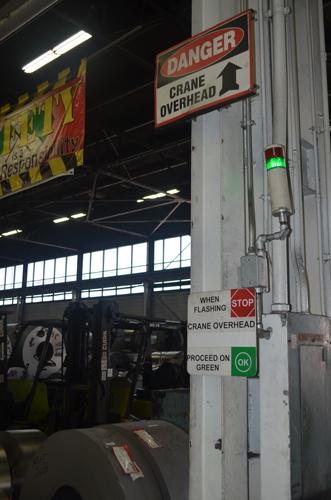
In the press area, workers have a visible indication when it’s safe to cross through the large bay area. When the red light is flashing, a crane is in operation, and employees have to wait to pass.
“Every employee receives training because we do not want to take chances,” Okere said.
Safety Commitment to Continue
Safety awareness is an everyday activity, and Okere said that’s a continuing challenge. He doesn’t mind it, however, because Tempel’s management is dedicated to his programs, and he likes his co-workers.
Even longtime employees, those with more than 30 years of service, have come around to appreciating the effort to minimize the risks associated with manufacturing laminations, according to Okere. It’s a gradual process, but he’s been able to win over most of the people in Tempel’s Chicago facility.
“What I intend to accomplish is to maintain the high standard of safety here,” Okere said. “We need to keep cooperating and not have a gap in our commitment because everything could collapse.”
Okere has a positive feeling about Tempel’s safety efforts, and the results speak for themselves. The company plans to be a contender for the Rusty Demeules Award for Safety Excellence in the coming years.
The Rusty Demeules Award for Safety Excellence
The Fabricators & Manufacturers Association’s Award for Safety Excellence, which is sponsored by CNA, is named after Rusty Demeules, a longtime association member. He worked for his family’s metal fabricating company, Standard Iron and Wire Works, Monticello, Minn., and served as president of the FMA/CNA Safety Committee from its inception in 1989 until 1996. He also served seven years on the FMA board of directors from 1983 to 1989.During his time on the Safety Committee, Demeules worked to develop the FMA-sponsored insurance program that is tailored for fabrication companies and tool- and diemaking shops. CNA has been FMA’s endorsed business insurance provider for more than 20 years.
Applications for the Award for Safety Excellence are accepted each year during January and February. The winning company receives:
• Complimentary registration and travel expenses for a company representative to attend FMA’s Annual Safety Conference.
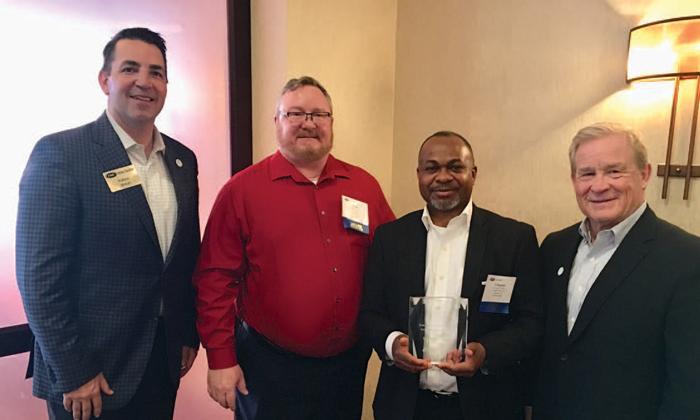
Pat Simon, director, member services and education, Fabricators & Manufacturers Association; Dan Smith, Tempel, Chicago; Chigozie Okere, global environmental, health and safety manager, Tempel; and Roger Wilson, assistant vice president, CNA Insurance, pose with the 2019 Rusty Demeules Award for Safety Excellence, which was presented to Tempel, Chicago, for its commitment to ensuring a safe culture in its facility.
• An engraved, crystal award to be presented to the representative at the Safety Awards dinner at the conference.
• A safety training package of relevant resources from the FMA Store.
• Recognition in FMA publications.
The award is presented at the annual spring FMA Safety Conference. You can learn more by contacting Nancy Hatten of FMA at nancyh@fmanet.org.
About the Author

Dan Davis
2135 Point Blvd.
Elgin, IL 60123
815-227-8281
Dan Davis is editor-in-chief of The Fabricator, the industry's most widely circulated metal fabricating magazine, and its sister publications, The Tube & Pipe Journal and The Welder. He has been with the publications since April 2002.
subscribe now

The Fabricator is North America's leading magazine for the metal forming and fabricating industry. The magazine delivers the news, technical articles, and case histories that enable fabricators to do their jobs more efficiently. The Fabricator has served the industry since 1970.
start your free subscription- Stay connected from anywhere

Easily access valuable industry resources now with full access to the digital edition of The Fabricator.

Easily access valuable industry resources now with full access to the digital edition of The Welder.

Easily access valuable industry resources now with full access to the digital edition of The Tube and Pipe Journal.
- Podcasting
- Podcast:
- The Fabricator Podcast
- Published:
- 04/16/2024
- Running Time:
- 63:29
In this episode of The Fabricator Podcast, Caleb Chamberlain, co-founder and CEO of OSH Cut, discusses his company’s...
- Trending Articles
AI, machine learning, and the future of metal fabrication

Employee ownership: The best way to ensure engagement

Dynamic Metal blossoms with each passing year

Steel industry reacts to Nucor’s new weekly published HRC price

Metal fabrication management: A guide for new supervisors

- Industry Events
16th Annual Safety Conference
- April 30 - May 1, 2024
- Elgin,
Pipe and Tube Conference
- May 21 - 22, 2024
- Omaha, NE
World-Class Roll Forming Workshop
- June 5 - 6, 2024
- Louisville, KY
Advanced Laser Application Workshop
- June 25 - 27, 2024
- Novi, MI
























